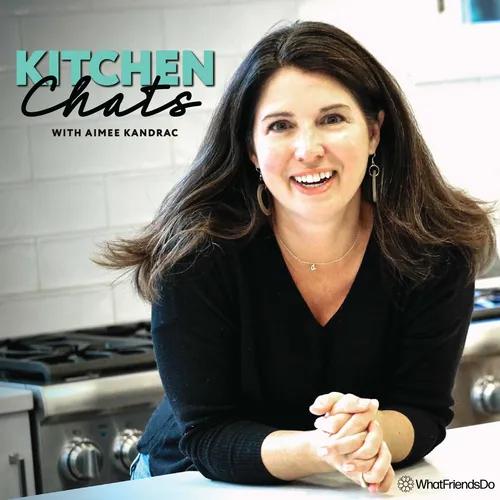Kitchen Chats with Aimee Kandrac Episode 3: Navigating Religion During A Crisis
- Author
- Aimee Kandrac
- Published
- Wed 09 Nov 2022
- Episode Link
- https://sites.libsyn.com/446388/kitchen-chats-with-aimee-kandrac-episode-3-navigating-religion-during-a-crisis
Listener advisory: There is a brief mention of suicide in this episode.
Like an increasing number of Americans, Aimee is no longer religious, which can be a touchy subject, especially during a life-changing event. So Aimee called Brian, pastor of Northminster Presbyterian Church in Indianapolis, to discuss navigating religion during a crisis. Brian shares the importance of presence and of creating sacred spaces that are inclusive of all types of people, including those who aren’t religious or of the same faith tradition. He also cautions against using prayers as platitudes.
Episode Highlights
“I’ll pray for you.”
During a life-changing event, someone will inevitably say, “I’ll pray for you.” If you’re a religious person, these words can be incredibly meaningful and comforting. But Aimee often doesn’t know how to respond.
Brian points out that prayers can be a way to tell someone that you care and you're thinking about them. He recounted a time when the family was going through a trying time, and a Hindu friend offered to pray for his wife Jennifer. Even though Jennifer didn’t know anything about how Hindu prayers, she knew her friend was sincere and would be holding her in her thoughts.
“If it’s someone that is deeply religious, and I know what that means for them is that they're going to invest time thinking about me and my situation, and if that’s all I think it is, that’s enough,” Brain said. “Because what more do we want, really? Yes, think about me. Send good energy into the world. Do something.”
When prayers are just platitudes.
Brian points out that it is a problem when someone says “I’ll pray for you” merely as a platitude or as a way to slide out of a difficult conversation.
“It’s really easy to hide behind religious jargon,” Brian said. “You hear some horrifying things come from the lips of people that you know and love in difficult moments because they don’t know what to say.”
Give the gift of presence.
As a pastor, Brian is no stranger to walking into a room amidst a traumatic experience and being at a loss for words. But he also knows that oftentimes words aren’t what’s needed.
“There’s no magic words there,” he said. “There isn’t an incantation; there isn’t a prayer; there isn’t a passage of scripture that somehow is going to make everything now fall into place and have it make sense.”
In those times, Brian knows the best thing he can do is often to be present and listen. He will sometimes ask: “What is it that you need from me right now?”
Equally important, Brian has learned when to walk away. When he senses he is unwelcome when he shows up to visit someone who is sick, he lets the family know how he can be reached or will leave a note and steps away.
“Who is it really about?” Brian said. “It can be about you when you get back in your car.”
Resources + Links
- Northminster Presbyterian Church
- Aimee Kandrac: Website, Facebook, Twitter, LinkedIn
- WhatFriendsDo: Website, Instagram, Facebook, Twitter, LinkedIn
About Aimee and WhatFriendsDo
Aimee Kandrac is a speaker, consultant, and the co-founder and CEO of WhatFriendsDo. Her work is instrumental for organizing support during life-changing events, and she speaks to organizations about creative ways to help friends and family during times of crisis. Aimee has been recognized as a Top 50 Mompreneur by Babble.com and is the first female CEO in the state of Indiana to close a $500,000 funding round. She has been featured in Forbes, Time, the LA Times, Oprah.com, the Indianapolis Star, and more.
WhatFriendsDo is a simpler way to create organized and actionable support during a time of crisis. The free, online platform empowers healthcare facilities, HR departments, families, and friends to easily coordinate meals, errands, transportation, childcare, communication, and more for those in the midst of a life-changing event. The women-founded and women-led company started as a solution for a friend with terminal cancer. WhatFriendsDo is based out of Indianapolis.
